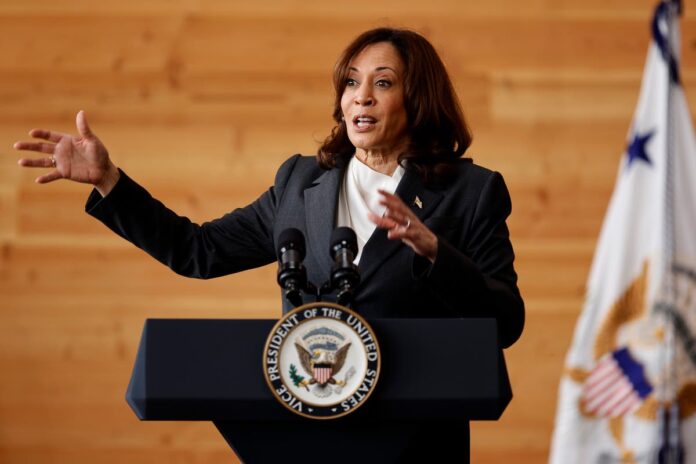Many years after leaving the presidency in disgrace, Richard Nixon spoke to CNN about his time as Dwight Eisenhower ‘s vice president and said that a vice president should consider themselves dispensible ‘and should do what the man wants.’ ‘Because otherwise, the man’s got to get down there in the ring,’ Mr Nixon said. Those words resonate when it comes to his successor, Vice President Kamala Harris . Like Mr Nixon, Ms Harris spent only a brief time in the United States Senate before a presidential candidate who was considered an elder statesman picked her to be his vice president. No vice president has probably struggled more with their image than Ms Harris. But recently, she’s assumed one of the more traditional roles of a vice president: the attack dog. Essentially, vice presidents engage in the fights that the president don’t to keep the boss’s hands clean and to make sure ‘the man’ doesn’t have to ‘get down in the ring.’ Most recently, she’s picked a fight with Florida Gov Ron DeSantis in response to Florida’s new curriculum surrounding Black history. Specifically, she’s criticised the fact that the middle school curriculum would teach students that enslaved people ‘developed skills’ that could be ‘applied for personal benefit.’ In response, Ms Harris has decided to take on Mr DeSantis. Friends of The Independent’s Inside Washington Newsletter at Politico’s Playbook reported that last month, she pushed for an impromptu event in Florida to criticise the curriculum there. Similarly, when Mr DeSantis invited Ms Harris to debate the curriculum, she outright rejected the overture, saying, ‘there is no roundtable, no lecture, no invitation we will accept to debate an undeniable fact: there were no redeeming qualities of slavery.’ On the surface, the focus might seem a little over zealous. Florida is no longer the swing state it was and while Mr DeSantis is certainly a candidate for president, he has seen his campaign lag ever since he jumped into the race. His campaign has bled staff and failed to raise the money necessary to be a competitor. But on the other, picking a fight with one of the most prominent conservative governors could show how Ms Harris can go on the offensive. Ever since she assumed office, her office has been mostly reactive, largely due to the fact that Mr Biden gave her the portfolio to handle immigration, something that has always been difficult for Democrats to handle, and voting rights, where her ability to effect change is limited since it would require an act of Congress. She also suffers from the fact her boss is himself a former vice president and she therefore would always be compared to him. Similarly, Mr Biden’s 36 years in the Senate compared to her short four means she often doesn’t occupy the typical vice president role of being the president’s chief negotiator on the Hill (indeed, Barack Obama spent as much time in the Senate as Ms Harris and did little to forge relationships even with his own party leaders). Mr Biden’s longstanding relationships with foreign heads of state has also meant that the typical vice presidential role as emissary abroad has been rendered moot. The fact that the Senate was evenly split when Democrats had a trifecta for Mr Biden’s first two years meant that Ms Harris always had to be nearby on the Hill to break ties, but there was little evidence this translated into her building the type of strong bonds that could assist her in the future. As the first Black and Indian woman to inhabit that role, she would naturally face more scrutiny than her predecessors. But her approval ratings have left some Democrats to speculate whether Mr Biden should drop her from the ticket (something it appears that he has never seriously entertained and says more about Washington than it does about the duo). As a result, people have largely forgotten the fact that during her time as a senator and member of the Intelligence and Judiciary Committee, Ms Harris often asked incisive questions of Trump administration officials and nominees and knew how to put her Republican colleagues on their heels. Similarly, her skills as a campaigner shone through in the first Democratic primary debate in 2019 when she went after none other than Mr Biden for his friendliness with segregationist senators and his opposition to busing. In addition, Ms Harris’s willingness to criticise Mr DeSantis is also about inspiring confidence that the Biden administration is willing to speak out to defend Black history given that Black voters are one of the most reliable Democratic voting blocs. To be clear, this alone likely will not salvage Ms Harris and she will need to do plenty more to bolster her image, especially if she is to seek the White House herself one day. But her decision clearly shows she sees this as a path to victory.
Can Kamala Harris’s fight with Ron DeSantis about Black history bolster her image?
Sourceindependent.co.uk
RELATED ARTICLES


